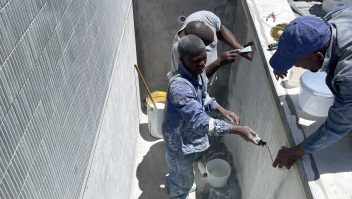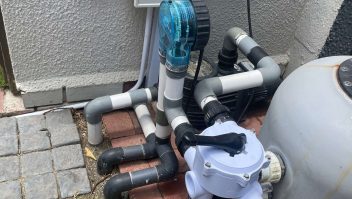When it comes to maintaining a swimming pool, one of the key indicators of a filter’s performance is its pressure gauge. Understanding what constitutes a “normal” pool filter pressure range is essential for ensuring your pool’s filtration system works efficiently, helping to keep your water clear and healthy. In this post, we’ll cover the normal pool filter pressure range, what it means for your pool’s health, and how to adjust it when necessary.
What is a Pool Filter Pressure Gauge?
The pool filter pressure gauge measures the amount of pressure in your filter system. This pressure is an indicator of how well your filter is performing. As water passes through the filter, it encounters resistance, and this resistance is measured by the pressure gauge.
Normal Pressure Range for Pool Filters
For most pool filters, a normal pressure range typically falls between 10 to 25 psi (pounds per square inch). However, this range can vary slightly depending on the type of filter you have, as well as the size of your pool. It’s important to keep track of the pressure regularly, as fluctuations can indicate issues with your filter.
- Sand Filters: Normal operating pressure is between 10-20 psi.
- Cartridge Filters: Normal operating pressure is 10-20 psi.
- DE (Diatomaceous Earth) Filters: Normal operating pressure is around 10-25 psi.
Why Does Pool Filter Pressure Matter?
A pool filter pressure gauge provides insight into your pool’s filtration system’s efficiency. If the pressure is too high or too low, it may signal that something is wrong, such as clogged filters or blocked pipes, which can result in poor water quality.
What Causes Pressure Changes?
Several factors can cause pool filter pressure to change:
- Clogged Filters: Over time, debris can accumulate in the filter, raising the pressure.
- Blocked Pump Impeller: A blockage in the pump impeller can restrict water flow and raise the pressure.
- Dirty Pool Filter: Regular maintenance is crucial to keep the filter clean and prevent high-pressure build-up.
- Low Water Levels: Insufficient water in the pool can affect pressure.
How to Adjust Pool Filter Pressure
If your pool’s filter pressure is too high or too low, there are several troubleshooting steps you can take:
- Clean or Replace the Filter – Regular cleaning of the filter will ensure it’s not clogged with debris. For a detailed guide, check out our post on How to Clean a Pool Filter: Step-by-Step Guide.
- Check for Blockages – Inspect the pump and filter for any blockages in the system.
- Check the Water Level – Ensure the water level in the pool is sufficient for proper filtration.
Conclusion
Monitoring your pool filter’s pressure gauge is a vital part of maintaining a healthy pool. By understanding the normal pressure range for your filter and addressing any changes promptly, you can extend the life of your pool’s filtration system and enjoy clean, clear water all season long.
FAQ Section
1. What is a good pressure for my pool filter? A good pool filter pressure typically ranges between 10-25 psi, depending on the type of filter and the pool’s size.
2. What happens if the pool filter pressure is too high? High filter pressure usually indicates a clogged filter or restricted water flow, which can lead to poor filtration and low water quality.
3. Can a dirty pool filter affect pressure? Yes, a dirty pool filter can cause the pressure to increase. Regular maintenance and cleaning are crucial to maintain optimal pressure.
4. How often should I check my pool filter pressure? It’s advisable to check your filter pressure at least once a week to ensure it’s within the normal range.
5. Can I adjust the pressure of my pool filter? You can adjust the filter pressure by cleaning or replacing the filter, checking for blockages, and ensuring the water level is adequate.
Internal Links
- How to Clean a Pool Filter: Step-by-Step Guide
- The Importance of Pool Water Chemistry for a Healthy Pool



